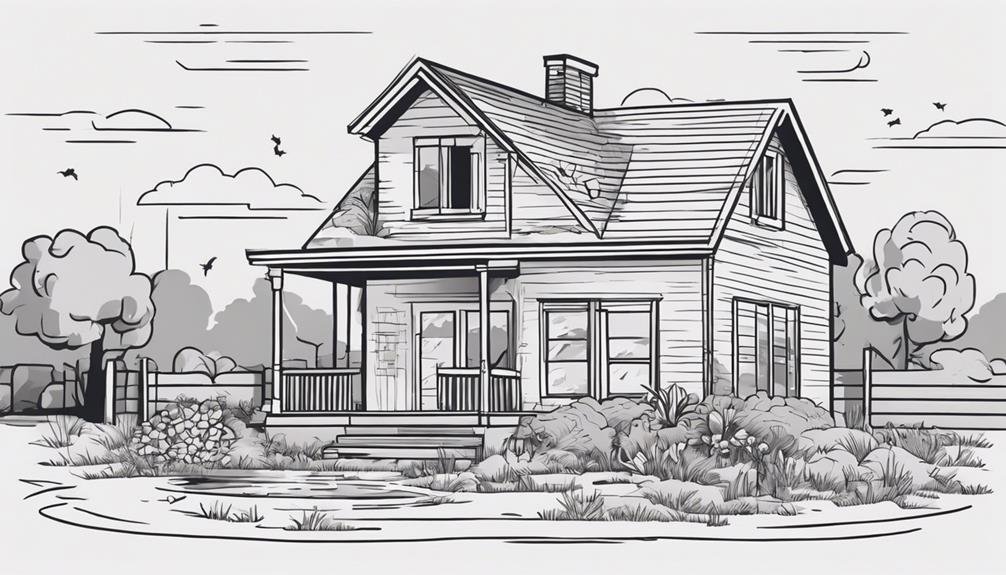If you think a blocked septic tank is no big deal, think again. Foul odors lingering around your property could be just the beginning of a much larger issue.
Imagine dealing with slow draining fixtures and mysterious puddles appearing in your yard. But wait, there's more. Gurgling sounds in your pipes hint at a problem bubbling beneath the surface.
Stay tuned to uncover the remaining signs that could indicate a blocked septic tank, and why addressing them promptly is crucial for your home's well-being.
Key Takeaways
- Foul odors, slow drainage, and gurgling sounds signal a blocked septic tank.
- Puddles in the yard and sewage backups are signs of septic tank issues.
- Lush grass over the drainfield indicates septic tank blockage.
- Addressing these signs promptly can prevent costly septic tank problems.
Foul Odors Around Property

If you notice foul odors around your property, it could indicate a blocked septic tank that needs immediate attention. To address this issue, consider odor control methods that can help alleviate the unpleasant smell. Regular property maintenance is crucial in preventing septic tank blockages. Neglecting maintenance can lead to environmental impact due to sewage leaks and contamination of soil and groundwater.
When dealing with foul odors from a blocked septic tank, avoid using harsh chemical solutions as they can have detrimental effects on the environment. Instead, opt for natural alternatives or consult with professionals for safe and effective treatment options. Proper maintenance and inspection of your septic system can significantly reduce the occurrence of blockages and foul odors on your property.
Slow Draining Fixtures
Should you observe slow draining fixtures in your property, it may be a sign of potential issues with your septic system, possibly stemming from a blocked septic tank. Slow drainage can indicate underlying problems that need prompt attention to prevent more severe issues.
Here are some key points to consider:
- Clogged Pipes: Slow draining fixtures could be a result of clogged pipes leading to or from your septic tank.
- Maintenance Tips: Regular maintenance, such as pumping your septic tank every 3-5 years, can help prevent blockages.
- Check for Tree Roots: Tree roots growing into the pipes can cause blockages leading to slow drainage.
- Avoid Harsh Chemicals: Refrain from using harsh chemicals that can harm the natural bacteria in your septic system, leading to blockages.
- Professional Inspection: If you continue to experience slow drainage after attempting maintenance, it's advisable to seek a professional inspection to identify and resolve the underlying issue promptly.
Puddles in Yard

Puddles in the yard can indicate potential septic system issues that require attention to prevent further complications. Water pooling on the ground surface may signal a problem with your septic tank or drainage field. When your septic system is blocked, it can lead to the ineffective drainage of wastewater, causing water to rise to the surface. This can result in puddles forming in your yard, especially around the area where your septic tank and drain field are located.
Moreover, prolonged water pooling can lead to soil erosion, which can further exacerbate the septic system's inefficiency. The excess water saturates the soil, washing away essential nutrients and affecting the stability of the ground. If left unaddressed, soil erosion can escalate the septic tank issues, potentially causing backups and more significant damages.
Therefore, if you notice persistent puddles in your yard, especially around the septic system components, it's crucial to have a professional inspect the system promptly to identify and rectify any blockages or malfunctions. This proactive approach can help prevent further damage and ensure the proper functioning of your septic system.
Gurgling Sounds in Pipes
Gurgling sounds in pipes can be an indication of potential issues within your septic system, particularly when experienced in conjunction with other symptoms like puddles in your yard. When you hear these sounds, it's essential to address the underlying problems promptly. Here are five crucial points to consider:
- Regular Pipe Maintenance: Ensure your pipes are inspected and maintained regularly to prevent blockages and buildup.
- Monitor Water Pressure: Fluctuations in water pressure can sometimes lead to gurgling sounds in the pipes, indicating a potential issue.
- Check for Clogs: Blockages in the pipes can result in gurgling sounds as water tries to pass through the restricted area.
- Septic System Inspection: Schedule a professional inspection of your septic system to identify any potential blockages or damage.
- Addressing the Issue: Act promptly when you notice gurgling sounds to prevent further damage to your septic system.
Sewage Backups in Home

When experiencing sewage backups in your home, it's crucial to act swiftly to prevent extensive damage and health hazards. To prevent sewage backups, regular maintenance is key. Ensure proper disposal of waste and avoid flushing items that can clog pipes. Consider installing screens over drains to catch debris and prevent blockages. Additionally, scheduling professional septic inspections can help detect issues early on and prevent backups.
For maintenance tips, be mindful of what you flush down your drains. Avoid pouring grease, oil, or large food particles down the sink. Use septic-safe toilet paper to prevent clogs. Regularly pump your septic tank to remove accumulated solids and prevent backups. DIY solutions like using enzyme-based cleaners can help maintain a healthy septic system.
If you experience frequent sewage backups, contact a professional for a thorough inspection. They can identify underlying issues such as blockages or septic tank problems. Taking proactive measures and following maintenance tips can help prevent sewage backups and ensure a smoothly functioning septic system.
Lush Grass Over Drainfield
To maintain the health of your septic system, pay attention to the presence of lush grass over the drainfield as it may indicate potential issues. When you notice an unusually vibrant patch of grass above your drainfield, it could be a sign of underlying problems. Here are some factors to consider:
- Soil Compaction: Heavy machinery or excessive foot traffic can lead to soil compaction, hindering the proper absorption of effluent.
- Root Intrusion: Tree roots seeking moisture and nutrients may infiltrate the drainfield, causing blockages and affecting its functionality.
- Hydraulic Overload: Excessive water use or leaky fixtures can overload the drainfield, leading to poor drainage and lush grass growth.
- Lack of Maintenance: Neglecting regular drainfield maintenance can result in issues that manifest as lush grass over the area.
- Septic System Age: Aging systems may experience wear and tear, impacting the drainfield's efficiency, ultimately reflected in the vegetation above.
Regular inspection and timely addressing of these issues are crucial for the proper functioning of your septic system.
High Levels of Nitrate in Well

High levels of nitrates in your well water can pose serious health risks. Nitrate contamination often stems from septic system issues, such as blockages or leaks.
It's crucial to address these concerns promptly to safeguard your health and well-being.
Well Water Contamination
Excessive nitrate levels in well water can result in serious health risks for those consuming it. When well water is contaminated with high levels of nitrates, it can pose significant dangers to human health.
Here are five crucial points to consider:
- Nitrate contamination can lead to methemoglobinemia, also known as blue baby syndrome.
- High nitrate levels can also impact the quality of the water, affecting its taste and odor.
- Nitrates in well water can contribute to environmental pollution and harm aquatic ecosystems.
- Regular testing and monitoring of nitrate levels in well water are essential to ensure safety.
- Implementing proper filtration systems can help reduce nitrate levels and protect against potential health hazards.
Health Risks Associated
Contaminated well water with elevated nitrate levels poses significant health risks, necessitating proactive measures to safeguard against potential hazards. High levels of nitrate in well water can result from agricultural runoff, septic tank leakage, or industrial discharge.
When consumed, nitrates can convert to nitrites in the body, reducing the blood's ability to carry oxygen, leading to a condition called methemoglobinemia or 'blue baby syndrome.' Additionally, nitrate exposure has been linked to an increased risk of certain cancers, thyroid disorders, and birth defects.
To mitigate these health risks, it's crucial to regularly test well water for nitrate levels, implement proper hygiene practices, and be aware of the environmental impact of nitrate contamination. Taking these precautions can help protect against potential health issues associated with high nitrate levels in well water.
Conclusion
If you notice foul odors, slow draining fixtures, puddles in your yard, gurgling sounds in pipes, sewage backups, lush grass over your drainfield, or high levels of nitrate in your well, you may have a blocked septic tank.
Ignoring these signs can lead to costly repairs and potential health hazards.
It's important to address these issues promptly to maintain the proper functioning of your septic system and avoid further complications.

